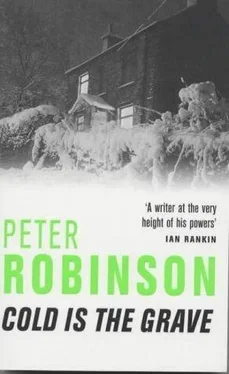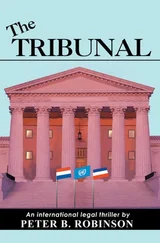“No. Absolutely none.”
Banks believed her. For one thing, Riddle wasn’t stupid enough to tell his wife he was having dinner with the man suspected of murdering their daughter. “Your husband told me that Clough was trying to blackmail him. Using Emily.”
“But Jerry would never agree to anything like that.”
“I think that was his dilemma. That was what tore him apart. Certainly Emily’s murder hurt him deeply, but this was what finally pushed him over the edge. There he was, a man of honor, who has to decide whether he wants to fall into the hands of a gangster or have his daughter and, by extension, his entire family, vilified in public.”
“Are you saying that he didn’t know whether he would have done what Clough asked or not, and he couldn’t face making the decision?”
“Possibly. But going by the tabloid article, it looks as if he had already turned Clough down, or that Clough had lost patience waiting.”
“If Clough was behind it.”
“Who else?”
“I don’t know.” Rosalind leaned forward. “But, if all you’re saying is true, it doesn’t make sense…”
“For Clough to kill Emily?”
“No.”
“That’s true. That’s what your husband said, too, when I asked him about it. Clough had nothing to gain. I still think he’s a strong candidate, but I must admit the whole thing’s been puzzling me a lot.”
“Who, then?”
“I don’t know. I feel as far away from a solution as I ever have.”
“What will you do about Clough?”
“Keep at him. There are other things we want to talk to him about, too. I’ve got to tell you, though, that I’m not at all hopeful about convicting Clough of anything, no matter what he’s done.”
“Why not?”
“A man like him? If he can blackmail a chief constable, imagine what else he’s got going, who he might have in his pocket. Besides, he never does anything himself. He delegates, keeps his hands clean. Even if, for some reason we haven’t considered, he was responsible for Emily’s murder, he’d have got one of his minions like Andrew Handley or Jamie Gilbert to do the dirty work. And he’s rich. That means he’ll be able to afford the best defense.”
“Sometimes I wish I was in criminal law,” Rosalind said, her eyes burning. “I’d love to take on his prosecution.”
Banks smiled. “First we’d have to persuade the CPS it was worth pursuing, and that’s a Herculean effort in itself. In the meantime, we’ve still got a murderer to catch.”
Rosalind sipped some wine. At least she didn’t pull a face and spit it out. “You’ve probably deduced this already,” she said, “but our marriage was very much a matter of convenience. He gave me the things I wanted and I didn’t embarrass him in public. I like to think I might even have helped him advance. Other than that, we went our separate ways.”
“Affairs?”
“Jerry? I don’t think so. For one thing, he didn’t have the time. He was married to his work and his political ambitions.” She looked Banks straight in the eye. “Me? A few. Nothing important. All discreet. None recently.”
They sat quietly for a few seconds. A gust of wind rattled the loose window upstairs. “You said you wanted to talk to me?” Banks said.
“Oh, it’s nothing to do with the murder. I’m sorry. I didn’t mean to mislead you in any way. It’s just that, well, you give the impression you think I’ve been holding something back, not telling you everything.”
Banks nodded. “Yes. I do think that. I have done from the start.”
“You’re right.”
“And now you’re going to tell me?”
“No reason not to, now. But first, do you think I might have another glass of wine?”
That evening at home, Annie reheated some vegetable curry in a bowl and sat in front of the television, hoping the flickering images would take her mind off her problem. No such luck. There seemed to be nothing on but nature programs, current events or sports, and nothing she watched had the power to absorb or distract her at all. She flipped through her meager collection and briefly entertained the idea of watching a comfort video, Doctor Zhivago or The Wizard of Oz , but she even felt too agitated to concentrate on a movie.
Damn Banks , she thought as she washed out her dish. How could he do this to her? Maybe she had let things cool between them romantically, but that gave him no right to treat her like some probationary DC who couldn’t be trusted with the full story. She knew that his action hadn’t been technically wrong in any way, but it had been dishonest and cowardly. As SIO, Banks was quite entitled to follow up a lead and decide whether it required action or not. Obviously, in the case of his night with Emily Riddle, he knew exactly what had occurred, so he knew that no further action was needed.
He must also have known that he was hiding the truth from Annie, though, or he would have told her about that night before, when he came clean about going to London to find Emily and having lunch with her the day she died. Annie remembered asking him then if that was all he had to tell, and he had said yes. That made him a liar.
So what to do about it? That was the question she agonized over. The way she saw it, she had two choices. She could, of course, simply do nothing, just put in for a transfer and leave the whole mess behind. That had its appeal, certainly, but it left too much up in the air. She had hidden from unpleasant things and turned her back for far too long. Now that her career had actually come to mean something to her again after the years of apathetic exile in Harkside, where she had conned herself into thinking everything was well with the world, Annie wanted to set things on the right track. And just how would an abrupt transfer look, with her inspector’s boards coming up so soon?
On the other hand, she could confront Banks and find out what he had to say for himself. Maybe she should give him the benefit of the doubt, innocent until proven guilty and all that. After all, it wasn’t as if she didn’t still have feelings for the bastard.
But she already knew he wasn’t innocent, that it was simply a matter of what he was guilty of. How much might a run-in with Banks upset her chances of making inspector? She didn’t think he was vindictive, didn’t think he would deliberately stand in her way, but everything has fallout, especially given the history Banks and Annie had between them.
Giving up on the television, Annie did what she usually did when she felt agitated and unable to find her calm center; she flung on her fleece-lined jacket and went for a drive. It didn’t matter where.
It had turned into a cold night, and she got the heater going full-blast. Even so, the car took a while to warm up. The mist was crystallizing on the bare trees, sparkling as her headlights flicked across branches and twigs on her way out of Harkside. Ice-crusted puddles crackled under her wheels.
She crossed the narrow bridge over the River Rowan between the Harksmere and Linwood reservoirs. Harksmere stretched, cold and dark, to the west, and beyond it lay Thornfield Reservoir, where the remains of Hobb’s End had once more been covered with water. That was where she had first met Banks, she remembered, toward the end of the hottest, driest summer in years. He had come scrambling down the steep rim looking like a sightseer, and she had stopped him at the bridge. She had been wearing her red wellies and must have looked a sight.
He still didn’t know this, but Annie had known who he was the minute she saw him – she had been expecting him – but she wanted a little fun first, so she had challenged him on the packhorse bridge. She had liked his manner. He hadn’t been stuffy or officious with her; he had simply made some reference to Robin Hood and Little John. After that, Annie had to admit that she hadn’t resisted him very hard.
Читать дальше












